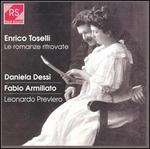|
Back
04/08/2011
Enrico Toselli: Le romanze ritrovate
Daniela Dessì (Soprano), Fabio Armiliato (Tenor), Leonardo Previero (Piano)
Recorded at the Gustav Mahler Saal, Toblach/Dobbiaco, Italy (September 4, 5 and 6, 2003) – 47’53
Real Sound RS 051-0105 – Liner notes in Italian and English - Texts in their original language (Italian and French)

If you’ve ever dreamed of whiling away a romantic evening in an Italian Belle Époque café sipping absinth, while imbuing the myriad delights of Italian salon music, Le romanze ritrovate (“The Regained Romances”) is guaranteed to take you there. These 20 short songs (the longest is 3’57”) are delectably sung alternatively by soprano Daniela Dessì and tenor Fabio Armiliato. They were composed in the early years of the 20th century by the eccentric composer Enrico Toselli.
Toselli (1883–1926), known as the Paderewski of Italy, lost his reputation in 1907 at the age of 24 when he married the 37-year-old Luisa of Hapsburg-Lorraine, who was at the time married to the future king of Saxony. Scandal followed them from that moment on, and people came to his concerts just to see his wife, whose presence in the audience was often required by her husband’s contract in order to draw the crowds! These expressive and melodic miniatures are all that remain of Toselli’s oeuvre.
Both Dessì and Armiliato hail from Genoa, and the couple, who are married, have performed in major opera houses throughout the world. Both have strong, expressive and splendid voices. Armiliato has a rich, mellow timbre that recalls the voice of Alfredo Krauss, but uses the “Italian throb” with the utmost discretion, as in “Serenata,” the only song of the 20 (popularized by Caruso and Gigli) that is well-known today. Dessì’s voice can range from the lustful and haunting, as in L’enfant (text by Victor Hugo), to the plaintive and melancholic, as in Il canto del dolore, from La principessa bizzarra. Both singers ring true. I was particularly moved by Dessì’s Dormi bimbo (a gorgeous lullaby), and by the heart-breaking pathos of Armiliato’s Spera! (sung with tenderness and sincerity). Dessì’s rendition of Una barca vuota has a mesmerizing fragility, and Armiliato’s wide range and high notes captivate right up to the final song on the disc, L’ultima serenata.
All texts are in Italian, except for three in French. Dessì’s French diction is superb and Armiliato’s is almost her equal. Leonardo Previero’s accompaniment is perfectly rendered and the recorded sound is immaculate. If there are no Belle Époque cafés in your neighbourhood, a fireplace or candle-lit room should work just as well!
Earl Arthur Love
|